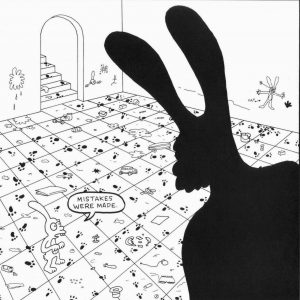by Gabrielle C. Durham

Folks love to pick on passive constructions. “Passive sentences are too wordy. They are unclear. They gave me a bruise.” Two out of three of these are objectively wrong. The third I can’t help you with.
Passive voice provides a valuable service. We all know when something bad happens, even if we do not know who or what caused the bad. The perfect opportunity to use the passive presents itself on such an occasion. If you insist on using active voice, you are forced to use the sloppy “someone” or “something” as the agents of nefariousness.
The house was destroyed, the livestock abducted, and the women were observed to be strangely beatific.
Something destroyed the house, someone abducted the livestock, and the absence of useless husbands pleased the women greatly.
Don’t get it twisted: The passive is not going to fit the bill every time. Reagan’s professing that “Mistakes were made” illustrates the weakness of the passive voice. No one is accountable in the passive, unless you consider whatever mealy-mouthed alleged subject follows the preposition “by.”
Your bicycle was run into by me in my car.
Eww. This is the verbiage of bureaucratic nightmare.
Let’s clarify what the passive voice is. Passive voice refers to a sentence in which the object of a sentence becomes the subject. The typical passive construction is a form of the copula (“to be”) and a past participle.
There are some advantages of the passive voice. It is useful when the agent is unknown. Scientific writing is full of passive constructions; who are we to say who did the creating, evolving, or demonstrating?
The passive voice also offers variety to sentences, and that ain’t nothing. In your writing you may want to emphasize the object more than the subject or the predicate. In that instance, using the passive voice makes oodles of sense.
The clown assassinated the politician.
The politician was assassinated by the clown.
Depending on the level of infamy, either the dearly departed statesman or Bozo may be emphasized more in these selections.
I realize this will appeal to a very small segment of the population, but if you enjoy the moribund skill of diagramming sentences, passive constructions provide veritable redwoods. Look, Ma, a new hobby!
Of course, there are disadvantages when employing passives. For people whose native language is not English, passive sentences can be unclear. Chasing down the subject that performs the predicate of a sentence is challenging in another language without ample practice.
Children learning to read have difficulty interpreting passive constructions, especially if they have executive functioning delays or hearing problems. Passive constructions add an element of complexity to syntax that many children do not grasp until they are older, more fluent readers.
Re: the verbiage of bureaucratic nightmare. When no sentence ever has an active subject, you can feel like you are trapped in the movie Brazil (1985). Too many passive constructions mess with the meaning of a text, lending a headless horseman feel. As noted here, overuse of the passive become an exercise in bureaucratic style in which no person is accountable, creating “an onslaught of evasion” of responsibility.
Some writers and writing instructors argue that the passive voice lengthens sentences gratuitously. This theory is soundly thrashed in this link.
Readers who think they are careful often observe a passive is in play when a copula and a participle merely appear in the same sentence.
The jazz vocalist is required to learn the art of throat singing.
When an intransitive verb is used, the misapprehension frequently occurs that the writer has employed the passive voice.
The time to protest has ended.
Both estimations are incorrect. As in so many aspects of modern life, we tend to overthink, which often leads to trouble.
There’s so much to be said about the passive voice in English that the Chicago Manual of Style graciously provided this list of experts’ eloquent declarations on the subject.
“But, G, I’m still not sure what you think about the passive voice. You have been so measured, so snark-free, and it has left me confounded.” (not passive, btw)
Here’s my take: The passive voice is not your enemy. It can frequently be your pal. It can add diversity to your writing. You get can into trouble when you rely on the passive overly, but as long as you keep track of the particulars, you should be able to navigate its usage quite agreeably. Don’t let your knee jerk you into a wrongheaded reaction to a perceived usage of the passive voice.
